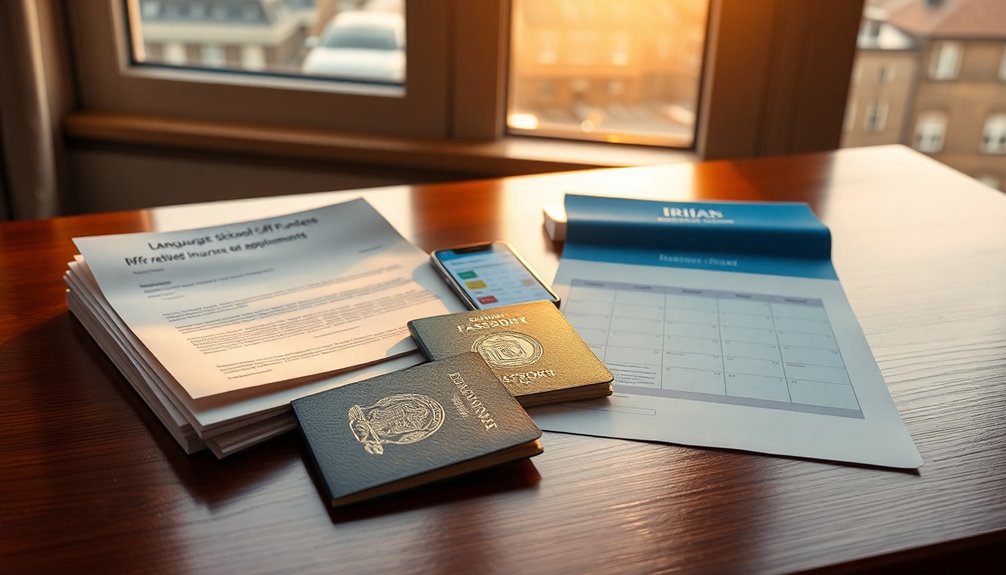
If you plan to study English in Ireland, you’ll need the right visa for course length and provider accreditation. Short tourist stays suit intensive courses under three months; longer programs require a student visa with proof of enrollment, funds, and health insurance. Working rights, biometrics, and post‑arrival registration depend on your visa type, so pick an accredited school and prepare documents early. Keep going to learn specific timelines, work rules, and extension options.
Overview of Ireland’s Student Visa Categories for English Learners
Steering through Ireland’s student visa system can feel intimidating, but it’s organized around a few clear categories that you’ll want to know. You’ll find short-term stays for intensive English courses and longer visas for accredited programs, each letting you balance study with exploration of Ireland’s heritage impact on culture and language. Choose a route that matches how much freedom you want — weekend trips, part-time work permissions, or focused immersion. Plan language learning strategies around course length and visa limits so you don’t overcommit. Check accreditation, duration rules, and renewal options to keep mobility intact. With clear choices and practical planning, you’ll navigate visas confidently and preserve the flexibility that brought you to Ireland in the first place.
Eligibility Criteria for Short-Term and Long-Term Courses
Now that you’ve got the broad categories in mind, it helps to know who qualifies for short-term versus long-term English courses in Ireland. You’ll want to check short term eligibility: usually non-EEA visitors joining courses under 3 months with a tourist or short-stay visa. For long term eligibility, you’ll need permission to remain for courses over 3 months, proof of enrollment in a recognized provider, finances, and sometimes health insurance.
Check short-term (under 3 months) with a tourist visa; long-term requires permission, enrollment proof, funds, and sometimes health cover.
- You crave freedom to explore without paperwork weighing you down.
- You fear being trapped by visa rules and want clear steps.
- You feel relief when requirements are simple and transparent.
- You celebrate when documentation opens new horizons.
Confirm exact conditions with official sources before you apply.
Choosing the Right English Language Program and Provider
How do you pick a course that actually matches your goals, budget and visa needs? You’ll want clear priorities: choose accredited options, check program accreditation and confirm the provider reputation. Think about course intensity, location freedom, and how the schedule fits life and visa limits.
| What to check | Why it matters |
|---|---|
| Accreditation | Guarantees quality and visa acceptability |
| Reputation | Alumni reviews show real outcomes |
Ask providers for syllabuses, class sizes, and refund policies. Visit if you can, or use virtual tours. Compare costs against living expenses and visa conditions. Pick a program that gives flexible scheduling and transferable credits when possible. That way you keep options open and move freely toward learning and future plans.
Required Documents for the Irish Student Visa Application

Before you apply, make sure you’ve gathered every required document—missing paperwork is the most common reason applications are delayed or refused. You’ll want a clear application checklist so you can move freely and confidently toward study in Ireland. Bring your passport, letter of admission from your provider, proof of accommodation, and passport-sized photos. Keep originals and certified copies handy.
- Fear melts when you hold your passport and admission letter.
- Relief comes with each checked box on your application checklist.
- Confidence grows when documents are organized and ready.
- Freedom feels real when you’re prepared to travel and learn.
Stick to official forms and translations where needed, and double-check expiry dates so your plans aren’t stalled.
Financial Proof and Tuition Payment Considerations
You’ll need to show proof of funds to cover living costs and any tuition not already paid. Check whether your course requires full, partial, or deferred payment before visa application, since timing affects what evidence you must submit. Make sure bank statements, scholarship letters, or payment receipts clearly match the amounts and dates required by Irish immigration.
Proof of Funds
Money matters: when applying for an Irish student visa, you’ll need to prove you can cover tuition, living expenses, and any dependent costs for the duration of your studies. You’ll meet specific proof requirements showing financial stability — bank statements, sponsor letters, or scholarship documents — so immigration can see you won’t be stranded. Be clear, honest, and prompt; freedom depends on predictable paperwork that lets you focus on learning and exploring.
- Relief: seeing funds confirmed removes fear and opens possibility.
- Confidence: solid documents let you plan boldly.
- Empowerment: you control your path without unexpected hurdles.
- Peace: proof eases entry, so you can start living and studying freely.
Tuition Payment Timing
While exact deadlines vary by institution, you’ll usually need to show payment of at least your first term’s tuition (or a confirmed payment plan) when applying for your visa, and some courses require full tuition paid before registration. You’ll want to check tuition deadlines early so you can lock in your spot and avoid last-minute stress. Think about payment methods — bank transfer, international card, or third-party sponsor — and confirm which your school accepts. If you value freedom, choose flexible options like staged payments or refundable deposits when available. Keep receipts and written confirmations; immigration officers often want clear proof. Plan ahead, meet the deadlines, and you’ll keep control of both your finances and your ability to start studying in Ireland.
Health Insurance and Medical Requirements for International Students
You’ll need to arrange mandatory health insurance that meets Irish student visa requirements before you arrive. Check whether a medical exam is required for your nationality or course length and what records you must submit. If you’re bringing dependents, confirm that your policy extends to them or buy additional coverage.
Mandatory Health Insurance
Most international students must have health insurance while studying in Ireland, and your school or visa conditions will usually specify the minimum coverage required. You’ll want to review health insurance options and do coverage comparisons so you can choose freedom-friendly plans that let you travel, study, and seek care without surprise costs. Pick a policy that balances emergency care, GP visits, and repatriation, and check network access near your campus.
- Relief when you’re sick and can keep studying
- Confidence knowing emergencies won’t trap you financially
- Freedom to pick providers within your plan’s network
- Security that lets you explore Ireland without fear
Always keep proof of insurance with your visa documents and renew on time.
Medical Exam Requirements
If you’re coming to Ireland as an international student, you may need to provide medical documentation or complete a health examination depending on your country of origin, course length, and visa type. You’ll want to follow medical examination guidelines carefully: these often request proof of certain vaccinations, a recent general health check, and, for some nationalities, chest X‑rays or TB tests. Health screening procedures are usually done by approved clinics or panel physicians; check the Irish immigration site or your institution for the approved list. Stay proactive—book appointments early, keep originals and certified translations, and carry digital copies. Meeting these requirements lets you focus on study and freedom to explore Ireland without administrative interruptions.
Coverage for Dependents
When you bring dependents to Ireland on your student visa, their health coverage and medical requirements will usually need to be arranged alongside your own — this means checking visa conditions for family members, securing appropriate private health insurance that meets Irish entry requirements, and preparing any required medical documents or vaccinations for each dependent. You’ll want clear proof of dependent coverage for visa dependents and to know whether public services apply. Plan ahead so your family can move freely without health worries. Consider emergency access, routine care, and repatriation options when choosing a plan.
- Feel secure knowing medical bills won’t trap your family.
- Imagine roaming without fear of denied care.
- Enjoy freedom to study while loved ones are protected.
- Choose coverage that respects your independence.
Visa Application Timeline and Key Deadlines to Track
Because visa processing times can vary, you should start preparing your application as soon as you decide to study in Ireland. Plan backwards from your course start date: allow time for document gathering, financial proof, medical checks if needed, and delays. Apply early—many students file 8–12 weeks ahead—to avoid rushed decisions. Use application tracking where offered to monitor status and respond quickly to requests. Note key deadlines: course acceptance, visa submission windows, and recommended arrival dates for orientation. Keep copies of submission receipts and timelines. If something changes—course deferral or funding—notify authorities promptly. Staying proactive gives you flexibility and reduces stress, letting you focus on learning and settling in once approval arrives.
Step-By-Step Online Application Process (Inis/Irl System)

Now you’ll walk through the INIS/IRL online form step by step, from creating an account to submitting fees. You’ll need to upload specific documents — passport photo page, admission letter, proof of funds, and any language certificates — in the required formats and sizes. Make sure each file meets the system’s naming, size, and format rules to avoid delays.
Online Application Steps
Before you start the INIS/IRL online application, gather your passport, letter of acceptance, proof of funds, and any required medical or insurance documents so you can complete each section without interruption. You’ll use the online submission portal to create an account, fill personal and course details, answer eligibility questions, and pay fees. Follow clear application tips: save drafts, double-check spellings, and note reference numbers.
- Breathe — this is a step toward autonomy.
- Focus — every accurate entry brings you closer to freedom.
- Persist — small setbacks don’t define your journey.
- Celebrate — each completed page is progress.
Submit confidently, track your status, and prepare mentally for the new life awaiting you in Ireland.
Document Upload Requirements
1. When you upload documents in the INIS system, know the accepted document formats and plan for quick, accurate submission methods. You’ll need clear scans or photos of passports, acceptance letters, proof of funds, and medical insurance. Save files as PDF, JPEG, or PNG and keep each under the size limit specified on the portal. Name files logically so you can find and replace them if needed.
Follow the system prompts for each document type; some require combined pages, others single files. You can upload from your device or cloud storage depending on what’s allowed. After uploading, review thumbnails and use the preview feature to confirm clarity. Retain originals and backup copies in case alternative submission methods are requested.
Biometrics, Interviews, and Supporting Evidence Checklist

Biometrics—your fingerprints and a digital photo—are a mandatory part of Ireland’s student visa process, and you’ll usually provide them at a visa application centre or during a scheduled appointment; in some cases, an Oireachtas or Irish embassy may also require a short interview to verify identity and study intentions. You’ll need to book biometric appointments promptly and focus on interview preparation so you can travel freely and confidently. Gather original documents, certified translations, and clear proofs of funds and enrolment.
Biometrics and a brief interview are required—book promptly, bring originals and translations, and prepare confidently.
- Relief: showing you’ve got organised calms the journey.
- Confidence: solid interview prep lets you speak your plans plainly.
- Freedom: accurate evidence opens the path to study abroad.
- Control: neat paperwork prevents last-minute setbacks.
Working Rights, Internships, and Course-Related Employment Rules
While you’re studying in Ireland, you’ll have specific work permissions tied to your course level and visa type, so know how many hours you can work during term-time, when full-time work’s allowed, and what counts as course-related employment or an internship. You’re usually allowed part-time hours during term and more during holidays; postgraduate research or certain full-time courses may permit greater working rights. Seek employment opportunities that respect visa limits and align with your schedule so you keep control of your time. For internship experiences, confirm whether placements are paid, credited, or require separate permission from immigration or your institution. Keep documentation of contracts and hours, and check rules before accepting roles so your freedom and status stay protected.
Post-Arrival Registration and Gnib/Irp Procedures
Arrival checklist: once you land in Ireland, you’ll need to register with immigration and get your GNIB/IRP card (the Irish Residence Permit) if your visa requires it—this proves your legal status, shows your stamp type and conditions (including work rights), and should be carried or kept accessible. You’ve got clear post arrival responsibilities: book your registration appointment, bring documents, pay fees, and expect fingerprints and a photo. Mind registration deadlines to avoid penalties or complications. The process secures your freedom to live and work within the rules.
- Relief when your IRP arrives — proof you belong
- Pride in handling bureaucracy — you’re independent
- Calm knowing dates and documents are sorted
- Confidence to explore without legal worry
Extending Your Stay, Visa Renewals, and Switching Course Levels

After you’ve registered and got your IRP, you’ll probably want to know how to extend your stay, renew your visa, or change course levels without jeopardising your status. You can explore visa extension options if your course runs longer or you want extra study time; apply before your permission expires and keep evidence of enrolment, finances, and attendance. If you’re switching providers or moving from an English course to a higher-level programme, notify immigration and follow rules for course level changes—sometimes you’ll need a new visa or endorsement. Keep clear records, meet deadlines, and stay in lawful status while you plan. That way you keep your freedom to study and travel without risking refusal or removal.
Common Application Pitfalls and How to Avoid Them
Ever wondered why some student visa applications get delayed or refused? You’ll face hurdles if you overlook common mistakes, but you can reclaim control with clear application tips. Be precise with documents, honest about finances, and meet deadlines so your plans stay free and flexible. Don’t let bureaucracy clip your wings — prepare methodically and keep copies.
- Missing or inconsistent paperwork that ruins trust and hopes
- Weak financial proof that makes officials doubt your independence
- Delayed submissions causing unnecessary stress and lost opportunities
- Poorly written statements that fail to convey your genuine purpose
Follow straightforward application tips, double-check everything, and ask for help early. That way you’ll protect your freedom to study and explore Ireland without surprise setbacks.
Some Questions Answered
Can Family Members Accompany Me on a Short-Term English Course Visa?
No — you generally can’t bring family on a short-term English course visa; visa regulations limit family support options, so you’ll need separate permits or longer-stay visas if you want dependents to join and enjoy more freedom.
Can I Study English While Applying for a Different Long-Term Visa?
Yes—you can study English while applying for a different long-term visa, but restrictions vary: juxtaposed freedom and rules mean you’ll need to check long term visa restrictions and meet any language requirements before enrolling.
Do English Schools Offer Guaranteed Accommodation Contracts for Visa Purposes?
Sometimes yes — some English schools offer guaranteed accommodation contracts to meet visa requirements, but you’ll want to check accommodation options, contract length, and rigidity, so you keep flexibility and freedom while satisfying official documentation.
Are Online or Blended English Courses Accepted for Student Visa Eligibility?
Generally no: Ireland usually requires in-person study for student visa eligibility, so online course eligibility is limited. You can seek blended learning options if the in-person component meets visa attendance and full-time study requirements.
How Does Brexit Affect UK Nationals Applying for Irish English Courses?
Like a tide that shifted, Brexit means UK nationals no longer have automatic freedom to study Irish courses; you’ll often need a visa or permissions, but you can still apply, choose programs, and assert your independence.
